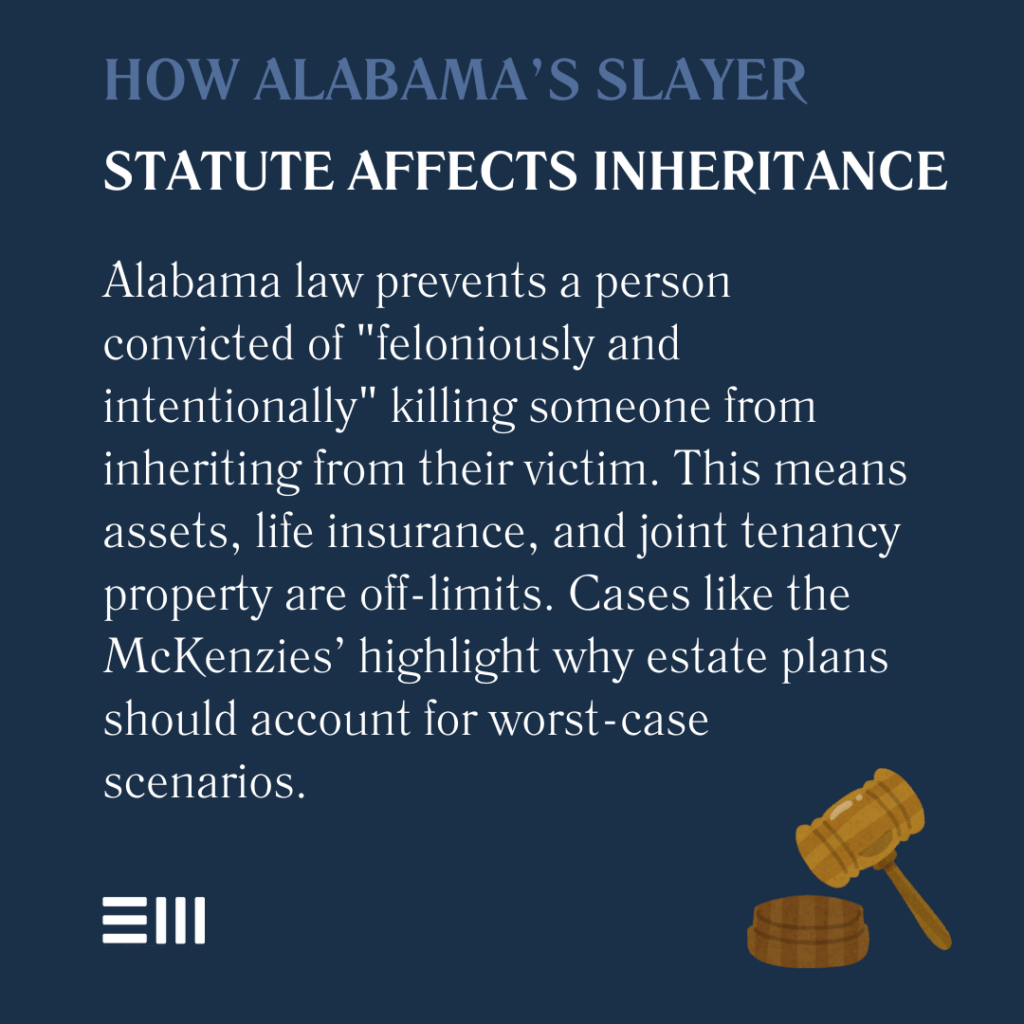
A shocking murder case in rural Alabama has sent ripples through both the legal community and families across the state, while raising profound questions about estate planning in cases of family violence.
On January 28, 2025, Michael McKenzie, 72, and Darla McKenzie, 68, both retired attorneys with distinguished careers, were found fatally shot in Etowah County. The case took an even more tragic turn when authorities charged their son-in-law, Christopher Scott Johnson, 38, with the murders. According to the Etowah County Sheriff’s Office, Johnson is being held without bail.
The circumstances of this case are particularly heartbreaking, given Michael McKenzie’s legacy of helping to exonerate wrongfully convicted individuals. As reported by WOOD, Mike McKenzie specialized in arson cases and worked pro bono to help free three men who were wrongly convicted in Michigan.
“Mike did all this incredible work without charging a dime to any of my clients or the clients of any other Innocence Project,” Michigan Innocence Project co-director Imran Syed told WOOD. “He was a beloved friend and mentor to many young lawyers across the country, and few can dream to leave behind as many monumental good deeds as he did.”
Darla McKenzie was equally accomplished, having retired as a partner at a Georgia law firm where she specialized in real estate law.
Estate Planning Considerations When Family Violence Occurs
This tragic case brings to light several critical estate planning implications that all Alabama families should consider:
1. Slayer Statutes and Inheritance Rights
Alabama, like most states, has what’s known as a “slayer statute” that prevents killers from inheriting from their victims.
Under Alabama law, a person who “feloniously and intentionally” kills another person cannot receive any property or benefit as a result of the death, including life insurance proceeds, joint tenancy assets, or inheritance through a will or trust.
The implications in family murder cases are significant. If Johnson is convicted of the McKenzies’ murders, he would be barred from inheriting any assets that might have come to him through his wife’s inheritance from her parents.

2. Contingency Planning in Estate Documents
The McKenzie case underscores the importance of including contingency provisions in wills, trusts, and other estate planning documents.
Without knowing the specifics of the McKenzies’ estate plan, cases like these highlight why having alternate beneficiaries and trustees named in your documents is crucial.
Estate plans should always include provisions for unexpected scenarios, including the death of primary beneficiaries or situations where a beneficiary is legally disqualified from inheriting. This foresight ensures that assets flow according to the decedent’s wishes, even in worst-case scenarios.

3. Guardianship Planning for Minor Children
In cases where family violence results in the death of parents with minor children, guardianship issues become paramount.
While the McKenzies were grandparents rather than parents of young children, their case reminds us why naming guardians for minor children—and having contingency guardians identified—is an essential component of comprehensive estate planning.
4. The Role of Trusts in Protecting Vulnerable Beneficiaries
Trusts can be structured to protect beneficiaries from potential abuse or manipulation. Had the McKenzies established trusts for their grandchildren, those assets would likely be protected despite the alleged actions of their father.
Properly structured trusts can include provisions that protect beneficiaries from both external threats and potentially from family members who might exploit them.
These protective measures become especially important in cases where family dynamics include potential domestic violence.
Community Response and Safety Concerns
Etowah County Sheriff Jonathon Horton addressed community concerns in a statement following the arrests.
“This is an incredibly difficult time for the McKenzie family, and our hearts go out to them,” Sheriff Horton said. “The loss of loved ones in such a tragic manner is devastating, and we extend our deepest sympathy to their family and friends. To the Etowah County community, I want to assure you that we are committed to ensuring justice is served, and there is no threat to your safety.”
While authorities have not released details on the motive behind the killings, cases involving family violence often highlight the need for both personal safety planning and comprehensive estate planning that accounts for worst-case scenarios.
Legal Proceedings Moving Forward
As of this writing, it is not immediately clear if Johnson has entered a plea or retained an attorney. The case will likely move through the Alabama court system in the coming months, with both criminal proceedings against Johnson and potential probate proceedings for the McKenzies’ estates running their course.
For Alabama families, this case serves as a sobering reminder that comprehensive estate planning must sometimes account for tragic and unexpected circumstances.
While no one wants to plan for the worst, proper legal preparation can help provide some measure of security and clarity during life’s most difficult moments.
If you have questions about protecting your family through comprehensive estate planning, contact Baxley Maniscalco at (256) 770-7232 to schedule a consultation.
Can't find what you're looking for? Search our site below.










